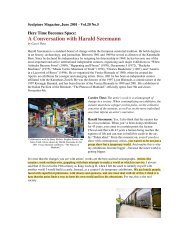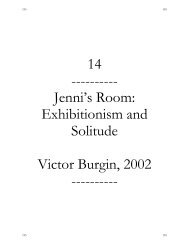Untitled
Untitled
Untitled
You also want an ePaper? Increase the reach of your titles
YUMPU automatically turns print PDFs into web optimized ePapers that Google loves.
On the New<br />
more you become subjected in the most radical way to the logic of museum<br />
collecting, and vice versa.<br />
Of course, this interpretation of the new, real, and living contradicts a<br />
certain deep-rooted conviction found in many texts of the earlier avantgarde—namely,<br />
that the way into life can be opened only by the destruction<br />
of the museum and by a radical, ecstatic deletion of the past, which stands<br />
between us and our present. This vision of the new is powerfully expressed,<br />
for example, in a short but important text by Kazimir Malevich: “On the<br />
Museum,” from 1919. At that time the new Soviet government feared that<br />
the old Russian museums and art collections would be destroyed by civil war<br />
and the general collapse of state institutions and the economy, and the Communist<br />
Party responded by trying to save these collections. In his text, Malevich<br />
protested against this pro-museum policy of Soviet power by calling on<br />
the state to not intervene on behalf of the art collections because their destruction<br />
could open the path to true, living art. In particular, he wrote:<br />
Life knows what it is doing, and if it is striving to destroy one must not interfere,<br />
since by hindering we are blocking the path to a new conception of life that is<br />
born within us. In burning a corpse we obtain one gram of powder: accordingly<br />
thousands of graveyards could be accommodated on a single chemist’s shelf. We<br />
can make a concession to conservatives by offering that they burn all past epochs,<br />
since they are dead, and set up one pharmacy.<br />
Later, Malevich gives a concrete example of what he means:<br />
The aim (of this pharmacy) will be the same, even if people will examine the<br />
powder from Rubens and all his art—a mass of ideas will arise in people, and will<br />
be often more alive than actual representation (and take up less room). 1<br />
The example of Rubens is not accidental for Malevich; in many of his earlier<br />
manifestos, he states that it has become impossible in our time to paint “the<br />
fat ass of Venus” any more. Malevich also wrote in an earlier text about his<br />
famous Black Square—which became one of the most recognized symbols of<br />
the new in the art of that time—that there is no chance that “the sweet smile<br />
of Psyche emerges on my black square” and that it—the Black Square—“can<br />
never be used as a bed (mattress) for love-making.” 2 Malevich hated the







